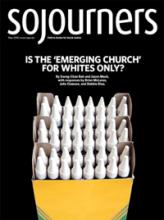The summer that I was 17 years old, I, who was born of missionary parents in China, was rooming with a friend whose parents were missionaries in Africa. Although our mothers had been friends long before we were born, Mary and I first met as summer employees at our denomination’s conference center when she came back to the States to go to college. World War II had driven my parents out of China, so I had lived, since the age of 8, in various places in the southern United States.
One night after the day of waitressing was over, Mary began to read aloud to me Alan Paton’s novel Cry, the Beloved Country. At first it was just the sound of Mary’s Africa-haunted voice caressing the beauty of Paton’s language that kept me wide awake and enthralled. But gradually, chapter by chapter, that beauty told me of the unspeakable oppression and tragedy that was South Africa’s story for too many years. I’m not sure exactly when it happened, but suddenly one night the book came alive for me in a new way. I saw for the first time that the tragedy of South Africa was the tragedy of the American South, where I had been blind to the oppression from which I as a white person had been exempt. I began to cry, sob rather, for my own thoughtless sins and the sins of my people.
I look back on those tears as a turning point in my young life. I did not leave all my sins and fears on that wet pillow—I’m still not free from them—but I know my life began to change that night because of a book.
Caroline Gordon, in her book How to Read a Novel, speaks of the reading of a great book as a “conversion experience.” You are not the same person when you finish the last page, she says, that you were when you first sat down to read. I believe, from my own experience, that Gordon is right, and that is why I think reading is so important to our growth as wise and compassionate human beings.
Read the Full Article

